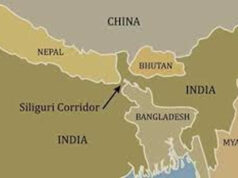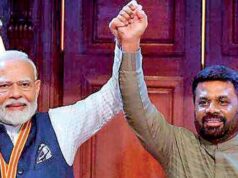Taliban Commander Ehsanullah Ehsan Confirms That Pak Army Operates Death Squads

An 11-minute audio clip released by former Taliban commander, Ehsanullah Ehsan, has made public the names of the officers of the Pakistan Army, who had facilitated his “surrender” and were handling him.
What has come as a bigger surprise is his claim that he was asked by the Pakistani Military Intelligence (MI) to be part of a “death squad” that comprised surrendered terrorists from various groups including Jaish-e-Mohammed and Ehsanullah’s former group, Tehreek-e-Taliban Pakistan (TTP).
The objective of this death squad was to eliminate individuals whose names were selected and compiled by the Pakistan Army. These individuals were regarded as “anti-state” by the Army and hence were chosen to be assassinated.
Ehsan said that he would be making the names of the individuals who were on this death list, public very soon. If the list and the content of it indeed become public and if it emerges that individuals on that list have been killed, it will confirm the long held suspicion that Pakistan Army has been operating and managing death squads that it uses to silence “troublemakers”.
These revelations have been taken cognizance of by international agencies and can have a bearing on the Financial Action Task Force’s (FATF) meeting, which is expected in September to review Pakistan’s case before it is placed in front of the FATF plenary, which is likely to take place in October.
Ehsan further added that the list had names of people mostly from Peshawar, Quetta and Mardan. “I was shown a list of those individuals the Pakistan Army wanted to eliminate, many of them were Pashtuns from Khyber Pakhtunkhwa province and a few of them were journalists,” he said.
Ehsan also claimed that he was told that there were multiple other similar death squads that were already working in other parts of Pakistan, mainly in the region of Balochistan, that were carrying out killings on the orders of the Pakistan Army.
The clip was posted on YouTube on 10 August, after which Ehsan had shared the details of the same with this newspaper and other media outlets.
In the clip, Ehsan has shared what happened with him and his family between his surrender in April 2017 and his subsequent escape. His escape was first reported by The Sunday Guardian (Pak Taliban leader Ehsanullah Ehsan ‘flees’ from safe house, 18 January) in January 2020, a fact which Ehsan, too, has confirmed in the latest clip during which he has stated that his news of escape was first broken by an “Indian newspaper”.
In this clip, Ehsan, whose real name is Liaqat Ali, has named multiple officers of the Pakistan military, some now retired and some still serving, who facilitated his surrender and then worked as his handler.
According to the conversation that he had with The Sunday Guardian post the release of the audio clip and his statement released online, he had met Lieutenant General Asim Munir, who was heading the MI at the time after his “surrender”; Munir later went on to become the chief of the ISI.
“After surrendering, I was taken to Peshawar by Colonel Umar of MI, who was designated as my handler. From there, I was taken to a safe house at Jailil road in Peshawar which also has a church and St. John’s Cathedral School.
My son Abbas Khan used to go to that very school. I stayed there for 18 months after which we were shifted to another safe house at Shami Road in Peshawar, which is near the PAF golf club. Apart from Colonel Uma, Brigadier Majid of MI was looking after me,” he has claimed.
In his audio message, Ehsanullah Ehsan has also shared photos from Google Map of the area where both the safe houses were located.
He told The Sunday Guardian that at any given time, five guards were stationed at his house, but they would not enter the house.
On the night of 12 January, he booked an online taxi with the help of his mobile phone. “I got out of the back door of the house with my family members and took a taxi to Haji Camp bus stand from where I took another vehicle. After a journey of 20 hours, I reached beyond the borders of Pakistan,” he claimed.
After travelling almost all night, once he reached a “safe” place, he called a Pakistani officer on WhatsApp to find out if he had heard of his escape. “I found out that no one had heard of my escape yet.”
Ehsan said that his surrender pact was signed by General Munir along with one Major General Aamir, who had stood as guarantor that all the promises made by the Pakistan Army to Ehsan would be met with.
“Some days after the surrender, I realised that I was under house arrest, I was not allowed to go out, nor was anyone allowed to meet me, despite the agreement that was signed clearly stating that there would be no restrictions on my movement.
Soon after, their behaviour and conduct became rude and they started reneging on their promises. When I called up Major General Amir, who had stood as guarantor, he simply said he was helpless.
Perhaps the Pakistan Army was confident that I would not escape as I had my family with me and secondly, I had myself surrendered by my own wish,” he told The Sunday Guardian while responding to why only five guards were placed to guard him.
The Pakistan Army, for the first time, commented on this matter on Thursday. In a press briefing at the Pakistan Army’s headquarters in Rawalpindi, its spokesperson, Major General Babar Iftikhar stated that Ehsan had escaped while taking part in a military operation.
“The comments made in the tape are absolutely baseless. He escaped while we were using him for an operation. He was in our custody and the information he gave helped us dismantle the terrorist organisations he was working for,” the spokesperson said.




